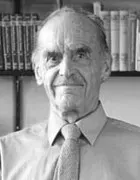Funeral speech by President Prof. Wolfgang A. Herrmann, February 5, 2016
- The spoken word is valid -
What is written on the memorial photo suits Walter Nitsch so well: his most beautiful memorial lives from now on in the hearts of those who knew him. When Walter Nitsch was born in Komotau, northern Bohemia, at the southern foot of the Ore Mountains, in the Czechoslovak Republic, the National Socialists had just seized power in Germany. They were on the way to dictatorship. It was precisely on this day that the civil rights of the Weimar Constitution were repealed (Reichstag Fire Ordinance). What happened also caused pain in Walter Nitsch's childhood and early youth, but in the end awakened and strengthened his love of freedom. Walter Nitsch learned early on to think for himself and not let others think for him. We knew him as an independent mind whose intellectual brilliance was proven in the continued, meticulous examination of complex scientific questions. The consistent experimental chemist has put what happens at interfaces between liquid phases, in the superposition of kinetic and reaction contributions, into a theoretical concept in a mathematically sound manner. Initially greeted with skepticism by experts, his approach quickly caught on and helped the 32-year-old student of Franz Patat receive the Karl Winnacker scholarship, the first to be awarded to a technical chemist.
Before Walter Nitsch started elementary school in Brüx, northern Bohemia, not far from his hometown of Komotau, the Sudetenland had been annexed by the German Empire. He had to leave high school in Brüx after two years because the population was expelled from Czechoslovakia at the end of the war (Benesch decrees). So he came to Magdeburg, to the Otto Guericke School, again for just two years before escaping the Russian occupied zone. The family was able to put down new roots in the Allgäu (1947); Walter Nitsch completed high school in Kempten in 1951 with his Abitur. Initially an unskilled worker in the Seltmann paper factory and in the laboratories of the Hoechst color works, he began studying chemistry in Innsbruck, graduated there in 1956 with a “doctoral degree” and was then able to complete his doctoral thesis with Erika Cremer in physical chemistry. From then on he was drawn to kinetics, which he had learned in Innsbruck using the example of the build-up and breakdown reaction of calcium carbonate. The path then led him to Munich as an assistant to Franz Patat, the grand master of technical chemistry. Here, at the Technical University, he developed his own scientific style and received his habilitation in 1966. This work became his life's program as a researcher: "The kinetics of interfacial reactions and their significance for mass transfer between liquid phases."
The private lecturer took a two-year leave of absence in the research laboratories of Farbwerke Hoechst in order to learn how to transfer material transformations in organic chemistry from the laboratory to the technical scale. Reaction kinetic considerations were again the focus of his research work. Returning to our “dear, old TH” (1971), he became an adjunct professor and soon afterwards commissioner of the chair for petroleum chemistry (Spengler). He had rejected calls to Stuttgart and Berlin. In 1973 he received the Dechema Prize. Walter Nitsch succeeded his teacher Franz Patat in 1977. In the meantime, two new chairs had been created at the TU, gradually occupied by Kurt Dialer (1970) and Robert Kerber (1973), who initiated macromolecular chemistry here. This list, which defines the profile of our university's chemistry, has remained the same. In 2007, the current dean, Kai-Olaf Hinrichsen, succeeded Walter Nitsch. The Faculty of Chemistry currently has 40 professors, with more to follow this year; It not only trains chemists, but also chemical engineers.
This expansion, combined with significant new construction, renovation and infrastructure measures worth well over 100 million euros, made Walter Nitsch particularly pleased as an interested emeritus. During my active time in inorganic chemistry and later in my new position, he became a friend to me. We met again and again in his emeritus room, where the university-wide smoking ban imposed by the president was briefly suspended in favor of a good cigar. How much and exuberantly we laughed together, and how much we liked each other! I missed him all the more when the shadow of his illness fell over my long-time friend. In 1990 he followed me as dean of our faculty, when he supported the new research neutron source FRM II with an important memorandum (with Dietrich and Glasses). He was there at the topping-out ceremony in 1998. We remember Walter Nitsch not just as a bright head, but as a bright character with an upright walk. His colleagues and students learned from him that judgment and a sense of proportion belong together, as do seriousness and cheerfulness, ambition and composure, living and letting live - entirely in the spirit of Liberalitas Bavariae, which he had internalized in his new Bavarian home. We now commend him to the grace of God. Rest in Peace.
